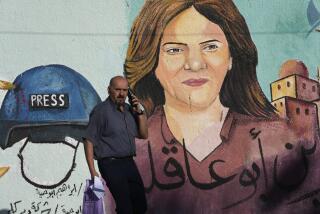The Role of the Press in Wartime
- Share via
Anger with the press is never far below the surface in America, but it has risen as the horrors of war have been brought home--and as the sometimes rough ways of the press have become ever more visible--with extensive broadcast and print coverage of the Persian Gulf crisis. The headlines scream of hundreds of civilians killed; correspondents in briefing rooms verbally joust with military officials who refuse to tell them all they want to know. This is not the first living-room war, but it is surely the first war whose coverage-by-press-conference is at least partly visible in the living room.
That has created many arm-chair media critics. And if recent polls are to be believed, many Americans don’t like what they’re seeing. To them the press seems like an intrusive, annoying presence, at a moment in history when all Americans ought to be closing ranks. While the performance of the press is sometimes praised--this newspaper’s coverage of the war, for instance, has generated many supportive letters to the editor as well as criticism--the general trend is not positive. CNN, in particular, has taken a lot of heat for correspondent Peter Arnett’s transmissions from Baghdad. Recent newspaper headlines about the gruesome shelter bombing in Baghdad have been denounced by some as playing into Saddam Hussein’s hands.
Such criticisms of the press are a healthy sign that vigorous debate in America thrives. The press is a prominent institution in this society. Why should it be immune to criticism? The press, faced with conflicting information and brutally frequent deadlines, can and will make mistakes. It must learn from them.
But it is precisely this culture of criticism that allows the press to breathe. For if in many societies the press is a controlled organ of government, the press in America is not. And that, of course, is sometimes the nub of the problem. If the government is embarked on a relatively popular action, like this war, and the press is embarked on its critical mission of reporting the news as it sees it, rather than as the government would wish to have it, then the American people may wonder whose side the press is on.
The answer is that the press is on the people’s side--on the side of a society that welcomes dissent and criticism, that encourages hard and probing questions, that looks at the official version of events with an educated eye, and that seeks to serve only the truth. The press is an organ of a democratic society, not of the government. We are no more than eyes and ears of the citizens, and as the people’s surrogates, our mission is to act as an agent of democracy by helping to ensure the free flow of information, ideas and news. That is our job.
More to Read
Sign up for Essential California
The most important California stories and recommendations in your inbox every morning.
You may occasionally receive promotional content from the Los Angeles Times.










